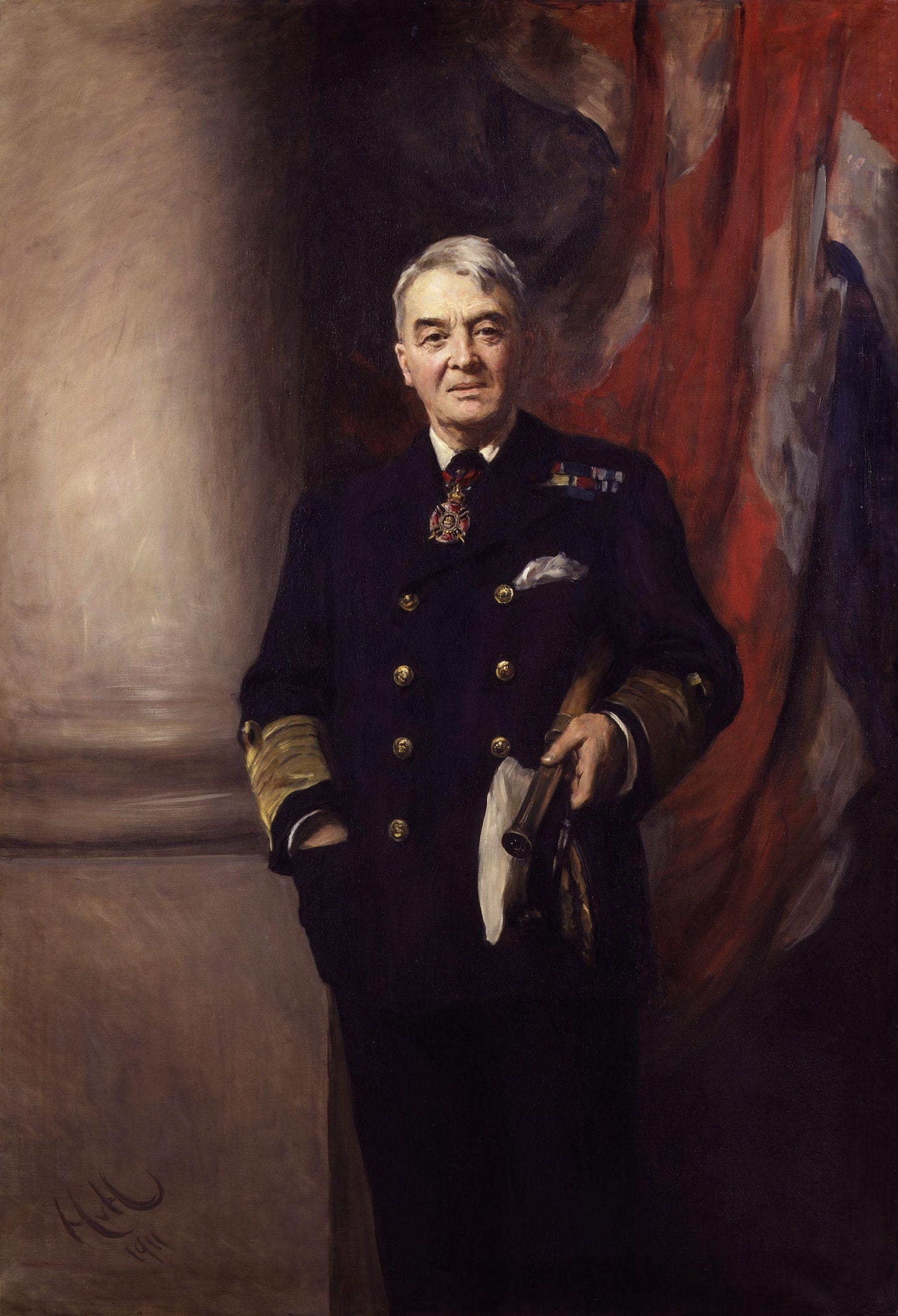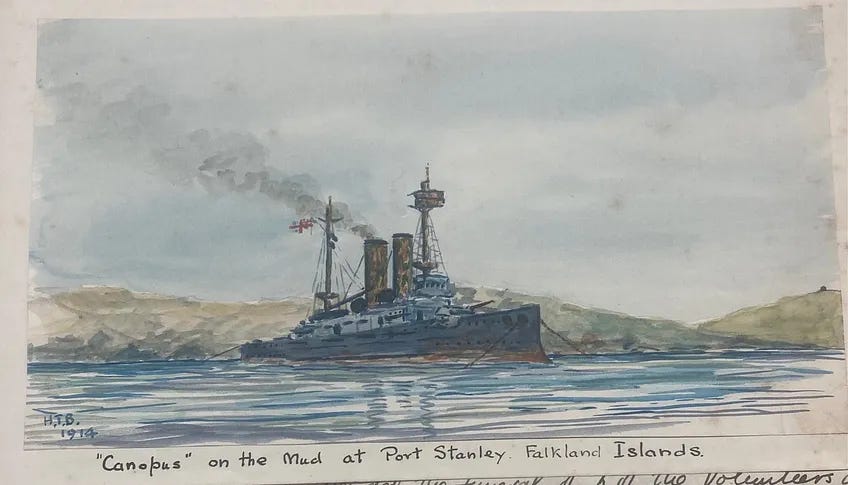The other day I was rummaging around on the book shelves in the Volunteer’s Centre and came across a copy of Jackie Fisher’s book “Memories” and immediately began searching for any references to von Spee because… well it’s me.
Any way I did indeed find a few references and one caught my eye which I thought I would disect as he had some very interesting ideas of what the German was going to do in the South Atlantic.
I should probably introduce Jackie Fisher in a short overview before I go into his writings just to give a bit of context.
Fisher is a very divisive character especially at the time he was First Sea Lord in 1904 but he was responsible for pushing the idea of Dreadnought and her ilk focusing on big gun warship as well as kicking off a modernisation process in the Royal Navy getting rid of 150 ships from the Victorian Navy and setting up a replacement process as well as championing the Torpedo-boat Destroyer (or later Destroyer) as a class. He would retire from the Admiralty in 1910 but with the First World War starting very lacklustre for the Royal Navy he returned in time for the defeat of Coronel. He was a good fit for working with Churchill and grounded him in a lot of policies but their relationship was more than a bit strained leading to his resignation over the Dardanelles crisis the following year however he was a dynamo of action and saw the response to the threat of von Spee’s squadron quickly and decisively.
In his book Memories he wrote the following;
I have to reiterate about von Spee, , as to this day the veil is upon the faces of our people, and they do not realise the Salvation that came to them.
We Should have had no munitions - our nitrate came from Chilli (sic)
We should have lost the Pacific - the Falkland Islands, would have been another Heligoland and a submarine base.
Von Spee had German reservists, picked up on the Pacific Coast, on board, to man the fortifications erected on the Falkland Islands.
He would have proceeded to the Cape of Good Hope and massacred our Squadron there, as he had massacred Craddock and his Squadron.
General Botha and his vast fleet of transports proceeding to the conquest of German South West Africa would have been destroyed.
Africa under Hertzog would have become German.
Von Spee, distributing his squadron on every ocean would have exterminated British Trade.
That’s not a bad resume!
There is quite a bit to unpack here so I will have a wander through point by point
The situation by the end of November in the Pacific and the Pacific coast of South America was very much in the Allied hands with no way for the Germans to dispute that. The main German colonies of Neu Guinea and Tsingtao had fallen and the only German warships that were battleworthy were von Spee’s Squadron which had quit the theatre.
Following Coronel the Japanese had an armoured cruiser and a British light cruiser sailing south from Mexico and the battle-cruiser Australia approaching and this ship on its own could decimate the entirety of von Spee’s squadron. Should the Germans take the Falklands fall to von Spee (and they wouldn’t but I’m coming to that) then the Admiralty would have closed Cape Horn to merchant traffic but the route to the Panama Canal was open and the merchant ships could be redirected that way.
Also had the nitrate been cut off completely the Royal Navy would have had to act and had the ships available, though it would mean weakening other stations to do so, and they would have been able to defeat von Spee in the end.
As for the reservists - yes there were extra reservists aboard the German ships but there were not that many to occupy the Falklands as when they came aboard von Spee was very conscious about the extra mouths to feed and many willing German volunteers were available in Valparaiso. These men would be available with the Marines aboard ship and on paper they could have taken the defenceless Falkland Islands and fortified them.
However they weren’t defenceless.
The pre-dreadnought battleship Canopus had been turned into a fortress and settled on to a mudbank and an observation point placed on high ground to spot for the battleship’s guns.
Other defences were established including three 12 pounders on Ordinance Point, a 12 pounder at Hooker Point with a machine gun to repel landings, another 12 pounder at Arrow Point covering the entrance of Port William Harbour, a look out station at Arrow point and two further 12 pounders at Lake Point to repel landing forces.
A defence force of civilians had been raised as well to aid the Canopus’s marines and excess crew in repelling an invasion. (for more information on British preparations at the Falklands check out here.)
Should the Germans attempt to land they would not have had it easy and they would have sustained casualties and been forced to expend a lot of irreplaceable ammunition to do so.
Although the women and children had been relocated from Stanley, in case of a German raid, but they would still need to be managed should there be an occupation which would require a lot more men than von Spee had available to him. Also with what would they build their defences on the islands? If they don’t inherit the British weapons they would have to offload guns from their own ships and this would take time.
It was also not within von Spee’s aims to take and hold the islands as there was no real advantage to do so. For the German admiral the main aim was to take supplies and coal before continuing the Squadron’s journey north. Any ammunition expended could not be replaced, any damage gained was almost impossible to repair, any casualties sustained unlikely to be replaced. The whole of von Spee’s campaign since August had been to avoid action and disappear so why risk his ships and men to hold the islands who, beyond their coal depot (which the British would probably would set alight rather than let the Germans take it) and a shipyard which they may not be able to use properly.
It isn’t in the text I quoted but Fisher referred to von Spee having eleven ships which approached the Falklands but the force was actually eight and two of those were supply ships and one was a liner being used as a hospital ship whereas his warships were two Armoured cruisers and three light cruisers. The idea of them converting the Falklands into a new Heligoland is really quite far-fetched with the resources that von Spee actually had to hand. Also the idea of it becoming a U-boat base is also quite a far fetched idea as the U-boats would have had a massive distance to travel and even if they arrived (having had to find resupply in neutral countries possibly) they would find there were no facilities to support them.
Even I, a huge fan of von Spee, would not even consider this within the Admirals' aims or abilities.
More importantly had the Germans somehow captured the island and begun fortifying them and turning them into a “new Heligoland” then the Australia would soon arrive, possibly followed up by the Idzumo and Newcastle would have swept them away in January.
Hopefully I’ve dispelled the occupation of the Falklands part and so I’ll move onto the Africa part.
Yes, von Spee could have decimated the Cape Squadron as there was only the aged Astraea and Hyacinth at his command with a pre-dreadnought battleship Albion. However the Albion might have taken a heavy toll on the German ships but that is open to conjecture - a well placed torpedo run by a light cruiser could doom the larger warship. Another point is that if von Spee was off the Cape of Good Hope who would be defending the Falklands?
It is possible that the Germans could interdict the South African troops in convoy however there were still the land routes into South West Africa so if anything the presence of von Spee would have only dragged that campaign out longer.
Having the German presence closer might have garnered more of a rebellion amongst the Boer people, something that the Maritz Rebellion did not really do but there was a lot of support for Botha, the South African premier so I’m not sure having five German warships off the coast would really encourage a mass revolt beyond the 12,000 that supported Maritz and I, personally, cannot seeing the whole of South Africa falling under James Hertzog’s premiership and joining South West Africa in the Central Powers. It just seems too much of a stretch of the imagination for just the presence of von Spee’s ships. There was a disgruntlement and anger about the end of the Second Boer War a decade before hand and there were those willing to fight the British but there was also a strong British presence and those who were willing to work with them as a precursor to gaining independence and the idea of siding with the Germans was not an acceptable one. If the presence of 10,000 German soldiers (3000 Schutztruppe Askari and their German regular officers as well as 7000 armed German settlers) wasn’t enough in South West Africa, then 2000 odd sailors would not swing that balance in my honest opinion.
So what threat did von Spee really pose?
Well there was definitely a threat to trade but as I’ve talked about in the Falklands posts I did at Christmas, there was a noose tightening around von Spee’s movements by December 1914 - the Cape was possibly the most vulnerable but there were reserves to deal with them should they appear, the way back was closed to them as were the South American Pacific coastline so I’m not sure what Fisher was thinking about…
Anyway, meandering monologue complete and I hope you’ve enjoyed it!







Great article. I wonder how different things would've been had the Germans had a few more years to build up the High Seas Fleet. The Kaiser's rashness certainly put them at a strategic disadvantage. British shoddy performance at the start of the war helped the Germans appear more formidable than they actually were, (loss of Cressy, Houge, and Aboukir among others). Also, Beatty's bum rush at Jutland gave the Germans a propaganda victory, if not one in fact. The "Spell of Trafalgar" was bent, but certainly not broken. Thanks for posting. Always enjoy learning something.